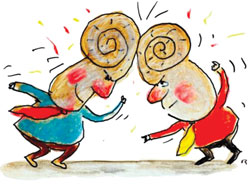 These days, people talk about the 'peace dividend' and the 'diaspora dividend'. But, the Beed wonders, what about the real nature of the democracy dividend. The democracy dividend is not the use of one's democratic rights to encroach upon the rights of others. It is not the freedom to burn tyres and vehicles and disrupt traffic on a daily basis. Neither is it an opportunity to put pressure on the government through petty violent means.
These days, people talk about the 'peace dividend' and the 'diaspora dividend'. But, the Beed wonders, what about the real nature of the democracy dividend. The democracy dividend is not the use of one's democratic rights to encroach upon the rights of others. It is not the freedom to burn tyres and vehicles and disrupt traffic on a daily basis. Neither is it an opportunity to put pressure on the government through petty violent means.
The real test of democracy for the eight parties getting into the new government-and the plethora of political forces that will still stay outside-is to see how they can bring discipline and governance within their own parties.
Democracy thrives best when parties are subject to strict internal governance, and this is replicated at the nation level of government. Student and trade unions are the arms of their political masters and the leaders should know how and when to rein them. Destroying government property is not acceptable in any country where political sanity prevails. When people supposedly part of the government torch vehicles and vandalise buildings regularly as a matter of course, what can one do but think that they are destroying public property so they can make some money in the next purchases or construction.
Law and order is deteriorating and the cops don't give us enough of a sense of security. Where's the sense in not re-installing police posts, when citizens can only be protected by their security apparatus?
The perception of the state of security, and the publicity one gets in the international press, determine the country's international image, and that's what tourism and investment flows depend on. That's clearly not the message conveyed by pictures of torched vehicles and student protests in the dailies.
Perhaps peace is back, but who will come, hearing of strikes at hotels in Pokhara at the beginning of a global holiday week and a possible potential strike on New Year's Day. Many countries and cities in the world are peaceful, but are still perceived as cities of disruption. Kolkata may have managed to redefine its image as an investment-friendly destination, but it's still seen as a city under siege and so, despite being a very friendly city, is hardly a preferred destination.
In a country where over half the population is under 25, youth force counts for something, and the Maoists have demonstrated how this power can be harnessed.
But our youth leadership in the unions and parties hardly demonstrates its genuine commitment to doing something for the youth. Remaining a union leader by studying at the same campus, doing the same course for over a decade hardly makes one an iconic figure for youth who believe in education. A curious parallel is in political parties that are driven by age and provide a platform for young people to take leadership positions.
Yes, there is a visible peace dividend-the smile back on the faces of Nepalis around the country. But the perceived democracy dividend gives one the right to take away that smile. Leadership is not only demonstrated by knowing how to manage parliament and getting a plethora of legislation passed. It is also about managing ones cadre and having the power to restrain them. Without this, we can look forward to an extended fight for the ownership of the dividends of democracy.



